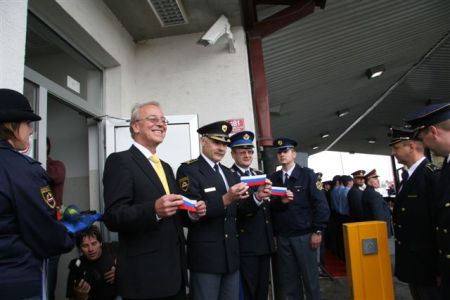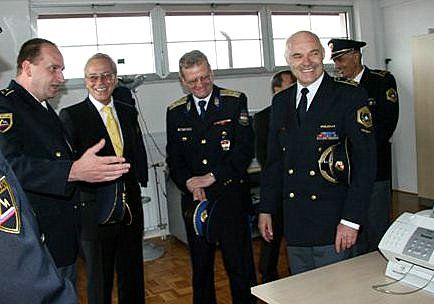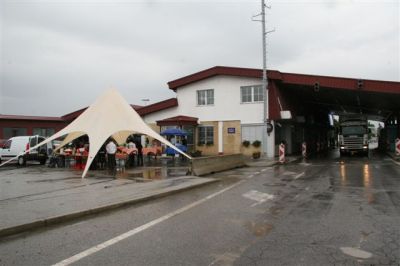Today, 18 June 2008, Director General of the Slovenian Police Jože Romšek together with his fellow Austrian and Hungarian colleagues and co-workers from the General Police Administration and the Murska Sobota Police Administration formally dedicated the newly constructed offices of the Dolga Vas Centre for Law Enforcement Cooperation (CSVO) and the Murska Sobota Police Station for Compensatory Measures (PPIU).
 Standing, from left: Dr Peter Widermann, Jože Romšek and István Samu
Standing, from left: Dr Peter Widermann, Jože Romšek and István Samu
István Samu, Deputy Director General of the Hungarian Police, and Dr Peter Widermann, Deputy Director General of Public Security in Austria, also attended today's ceremony.
 Tour of the new offices after the opening.
Tour of the new offices after the opening.
From left: Head of the Specialised Unit for National Border Control Dušan M. Schönwetter, Dr Peter Widermann, István Samu, Jože Romšek and Head of the Border Police Division Danijel Lorbek (at the back)
The new joint offices of the Murska Sobota PPIU were taken over by Murska Sobota Police Station Commander Ciril Magdič and by the head of the Dolga Vas CSVO, Igor Vrbnjak. The renovated offices used to be part of the Dolga Vas border crossing, comprising an area of just over 600 m2 with several parking places for police vehicles. The cost of the renovation amounted to EUR 331,000. Of this, 30% of the investment was funded by EU External Border Funds, whereas 70% was covered from the budget.

The official speaker at the opening was Director General of the Slovenian Police Jože Romšek, who said:
"The Centre was found as a result of good cooperation to date between the Slovenian, Austrian and Hungarian police forces, which now aims at becoming even more intensive. The decision on the establishment of an international centre for cooperation of security authorities in the triple border crossing between Slovenia, Hungary and Austria was adopted in 2005, when the three ministers of the interior, by signing the so-called Kaposvar Declaration, committed to the enhancement of every form of transnational cooperation within the expanded Schengen territory."
"The joint working space of the representatives of the three countries in Dolga Vas will become a part of everyday practice, not unknown to members of the Slovenian Police. Based on the experience of three years ago, when we established a similar international centre for the cooperation of security organs in Vrata-Megvarje, we can assume that this kind of police cooperation is very good and the results are more than excellent. Not surprisingly, several successful inquiries have been promptly and effectively dealt with in the Vrata-Megvarje centre."
"Similar results are expected here in the Dolga Vas centre. High expectations, I realise, but I am confident that you are up to the task. Especially because the police officers of the Pomurje region are familiar with this kind of work. The constant exchange of work experience, specific data and operational intelligence between neighbouring countries have enabled you to execute many successful actions of international coverage. From this day forward, working conditions will improve significantly, which gives you the possibility to intensify the cooperation with your colleagues from Austria and Hungary. The exchange and verification of data will be even quicker and more direct now, so you will become even more successful in detecting all forms of cross-border criminal activity."
"This form of cooperation is of pivotal importance. Effective implementation of measures on the external border and inland lies within the security interest of the entire territory of the European Union, and thus of Slovenia as well. The uncertainty or fear of the local residents that the level of security after entry into the Schengen territory will decrease is unnecessary. On the contrary! The level of security has been increased, which is due to better and easier cooperation between the police forces of the Member States. A committed struggle against illegal migrations and the detection of falsified documents, smuggling and other forms of crime have brought good results."
"As borders do not stop criminals, individuals or international criminal organisations alike, so should they in no case stop cooperation between colleagues of neighbouring countries. Joining forces with you, dear colleagues from Austria and Hungary, we will be able to prevent many a criminal organisation from continuing on their way from the Middle East into Central Europe."
"Please allow me to take this opportunity to thank all of you who helped shorten the way from the idea to its realisation. I express my gratitude to everyone who has contributed to the realisation of the centre."
"Which is one of the reasons for today's celebration. Following the entry into 'Schengen', Slovenia founded the so-called Police Stations for Compensatory Measures. They are intended to maintain or improve the security level, the protection of human life, personal security and property, even after the abolishment of border control. The station here, established first among the six others, now finally has adequate working conditions."
"On this occasion I wish to express my compliments to the six stations, which have always managed to be in the right place at the right time. Police officers provide for security throughout the territory of international transport links by using proper methods of work planning, by operating on the basis of risk analysis, by using special equipment, as well as by verification of data on the Schengen Information System. They can rely upon the good practical examples provided by the older Member States of the Schengen family, including Austria. The number of cases of illegal migration has been reduced and stabilised significantly because of the good cooperation with the security authorities of the neighbouring countries; however, this does not imply that illegal migration has stopped. Although Slovenia is generally not the target country of the immigrants, we must prevent every single attempt of illegal border trespassing. The Slovenian police accordingly devotes a great deal of attention to the detection of illegal residence or illegal transit passengers in Slovenia, especially in areas where such cases were most frequent."
"The Murska Sobota Police Station for Compensatory Measures, as well as the Dolga Vas Centre for Law Enforcement Cooperation, will guarantee a permanent high level of security within the Slovenian territory and abroad. Similar measures will be taken by their colleagues on the other side of the border. Together we will be joined in the struggle against cross-border crime, which is not limited to the territorial subdivision along the national border, and we will ensure security for all residents and maintain it at a constant high level."
"It is a great honour and pleasure for me today, exactly six months after Slovenia became a Schengen country, as the Director General of the Police, to be able to acknowledge the unselfish work of the tireless Slovenian police officers protecting the borders in compliance with the high Schengen standards. Without your efforts and expert execution of significant tasks in compliance with the legal regulations, the excellent results we are witnessing today could not have be obtained."
"I will always remember this time with pleasure and pride, as this is a period when another milestone in the history of the Slovenian police has been reached, a time also when cooperation between three neighbouring countries has been strengthened by the establishment of the so-called trilateral centre. Many successful tasks are behind us now, yet new responsibilities do not leave much time for rest. We strive to face new challenges, arising from unpredictable changes in society on a local as well as global scale."
 The offices of the former Dolga Vas border crossing are now shared by the Dolga Vas Centre for Law Enforcement Cooperation and the Murska Sobota Police Station for Compensatory Measures.
The offices of the former Dolga Vas border crossing are now shared by the Dolga Vas Centre for Law Enforcement Cooperation and the Murska Sobota Police Station for Compensatory Measures.
Centre for Law Enforcement Cooperation in Dolga Vas commences work

